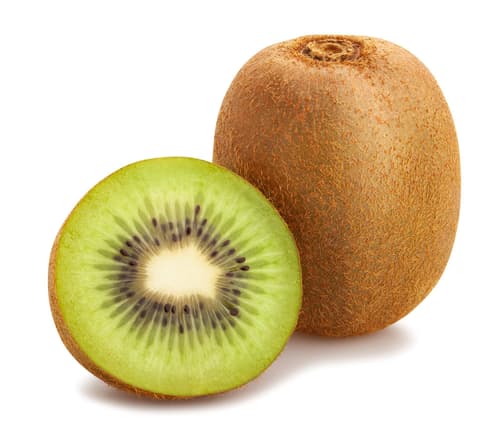
BIO Kiwi, loose
1 pcDelivery to your door
We source locally for the freshest groceries you can trust.
- Description
- Composition
- Similar products
- More from this brand
- Recipes
The shrub-like kiwi plant grows to be several meters long and is grown on trellises or stakes. Almost 70 kg of fruit hang like grapes on the plant; the more there are, the smaller the individual fruit. The oblong-oval kiwi with its rusty brown, furry skin is about 5-8 cm long, has a diameter of about 5 cm and weighs 65 to 100 g. The flesh is grass green with a white center and many small, blackish seeds. The delicious taste of the kiwi is often described as a mixture of gooseberries, melon and strawberries.
Origin
The kiwi is native to the high-altitude forest areas of China and Taiwan. Today it is mainly cultivated in New Zealand. There it also got its name, derived from the national and heraldic animal of Australia, the cute, flightless forest bird Kiwi-Kiwi, which lives in burrows. In addition to New Zealand, it is also cultivated in Australia, California, South Africa, South America and the Mediterranean countries. Kiwis have had a unique career. The juicy fruits, which are hardly considered exotic in Germany, the world's largest sales market, are available all year round.
Tips
When buying, make sure that the kiwis are not too soft or too hard. Medium-hard fruits have an optimal ripeness and full flavor. Kiwis can be kept in the refrigerator for several days.
Preparation
As a fresh fruit, kiwis are best enjoyed well chilled. To do this, cut them crosswise and spoon them out; you can also peel them and serve them sliced. The fine seeds are eaten with them. The already fine taste of the kiwi can be refined with lemon or orange juice, vanilla sauce, raspberry brandy, brandy or whipped cream. Kiwis are also recommended as an appetizing garnish for desserts, salads, cheese platters, etc.
Did you know?
Why are kiwis hairy?
No fruit is as furry as the kiwi. While peaches or apricots, for example, are only covered with a thin, velvety, edible skin, the kiwi has small, felt-like hairs. Viewed under a microscope, their structure is somewhat reminiscent of coarse brown root hairs. No wonder you don't like to eat them. However, the hairs protect the fruit from excessive water loss, which can occur through evaporation in hotter growing areas. The fur ensures that the kiwis remain juicy and do not become wrinkled.
Storage recommendation
The kiwi is one of the few exotic fruits that can be stored well in the refrigerator. Ripe fruits will stay fresh in the vegetable compartment for up to two weeks. Unripe kiwis should be stored at room temperature so that they can ripen and develop their full flavor.
